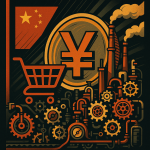Key Points
- A State Council (国务院) meeting on May 23, 2025 approved major initiatives in green manufacturing, eco-compensation, and food safety.
- China’s manufacturing sector will undergo a green and low-carbon transformation (2025-2027), focusing on adopting green tech, upgrading traditional industries, and boosting emerging green sectors.
- Reforms to the ecological protection compensation (生态保护补偿机制) system aim for a fairer, more efficient, and broader mechanism based on “whoever pollutes, cleans up; whoever protects, benefits.”
- Significant amendments to the Food Safety Law (食品安全法) are planned to create a more rigorous standard system, prioritize ex-ante prevention, strengthen whole-chain supervision, and implement severe penalties for violations.

Big moves are happening in China’s policy landscape, directly impacting manufacturing, environmental protection, and food safety – key areas for investors, tech innovators, and global businesses eyeing the Chinese market.
On May 23, 2025, a significant State Council (国务院) Executive Meeting, presided over by Premier Li Qiang (李强), greenlit several critical initiatives.
Let’s break down what was approved and what it means.
Revving Up Green Manufacturing: China’s Action Plan (2025-2027)
The meeting underscored a clear message: green and low-carbon development in manufacturing isn’t just a trend, it’s an imperative.
China is looking to supercharge this shift, focusing on green technology innovation and the broader adoption of advanced green tech.
This is all about building a solid green foundation for new industrialization (新型工业化).
Key Strategic Moves for Greener Production:
-
Transforming Traditional Industries:
Promoting a deep green overhaul of established sectors.
This involves actively applying advanced equipment and processes.
Think big policies like large-scale equipment renewal playing a role here.
The goal? Accelerate green upgrading and transformation in pivotal industries.
(Insight: This signals massive opportunities for companies providing green tech solutions and a need for traditional manufacturers to adapt or get left behind.)
-
Elevating Emerging Industries:
Guiding new industries towards high-standard green development.
This means boosting the promotion of clean energy and green products.
Improving resource recycling levels is also a major focus.
(Insight: Expect more incentives and support for businesses championing renewables, sustainable materials, and circular economy models.)
-
Strengthening the Green Ecosystem:
Ramping up breakthroughs in common key green technologies.
Refining standards in critical areas to set clear benchmarks.
Optimizing relevant policies to support the transition.
Enhancing the green manufacturing and service system to better empower enterprises in their transformation journey.
(Insight: This points to more R&D funding, stricter environmental standards, and a more robust support network for businesses going green.)
- Transforming Traditional Industries via green overhaul and advanced tech application
- Elevating Emerging Industries with high standards and promotion of clean/green products
- Strengthening Green Ecosystem through R&D, standards, policies, and service systems

Find Top Talent on China's Leading Networks
- Post Across China's Job Sites from $299 / role
- Qualified Applicant Bundles
- One Central Candidate Hub
Your First Job Post Use Checkout Code 'Fresh20'

Overhauling Ecological Protection Compensation: A Fairer, More Efficient System
The State Council is also focused on refining how China handles ecological protection compensation (生态保护补偿机制).
The vision is a system built on shared costs, shared benefits, and collaborative governance.
Why? It’s seen as crucial for beefing up ecological environmental protection and fostering coordinated development between regions.
Key Directives for a Better Compensation Framework:
-
Broader, Clearer, More Diverse:
Push for a horizontal ecological protection compensation mechanism that offers more comprehensive coverage.
Responsibilities and rights need to be clearer.
Methods should be more diversified, and governance more efficient.
-
Win-Win for Ecosystems:
Further refining key tasks and implementation measures.
The aim is to achieve positive interaction between ecological product supply areas (regions providing environmental benefits) and the beneficiary areas (regions benefiting from them).
(Linking Opportunity: This could integrate with carbon trading markets or create new types of “eco-credits” for businesses.)
-
Expanding the Scope:
Deepening the construction of these mechanisms in the main streams of major rivers.
Steadily expanding compensation areas.
Actively exploring compensation methods for other ecological factors like forests, grasslands, and atmosphere.
-
Rewards and Penalties:
Improving the system with clear rewards and penalties.
Adhering to the core principle: “whoever pollutes, cleans up; whoever protects, benefits.“
Studying and enhancing incentive and restraint policies to draw more social capital into ecological civilization construction.
(Insight: This suggests a stronger push for corporate environmental responsibility, with financial incentives for proactive protection and stricter penalties for polluters. It could also unlock private investment in conservation.)

ExpatInvest China
Grow Your RMB in China:
- Invest Your RMB Locally
- Buy & Sell Online in CN¥
- No Lock-In Periods
- English Service & Data
- Start with Only ¥1,000

Bolstering Food Safety: A Tougher Stance with a Revised Law
Recognizing that food safety is paramount to life and health, the meeting addressed crucial updates to China’s legal framework.
The “Draft Amendment to the Food Safety Law (食品安全法) of the People’s Republic of China” was considered and will be submitted to the Standing Committee of the National People’s Congress for deliberation.
Key Focus Areas for Enhanced Food Safety:
-
Urgent Needs First:
Improving relevant legal provisions based on the principle of addressing the most pressing needs first.
-
Stricter Standards:
Building a more scientific and rigorous food safety standard system.
This places a special emphasis on mandatory standards.
(Insight: Businesses in the food supply chain, from farm to table, should anticipate higher compliance bars and more stringent quality controls.)
-
Proactive Prevention:
Further promoting a shift in the food safety governance model towards ex-ante prevention (preventing problems before they occur).
-
Tighter Oversight, From Start to Finish:
Strengthening whole-chain supervision and ensuring regulatory focus moves downward to be closer to the ground.
This means strictly enforcing daily supervision and inspection.
-
Zero Tolerance for Violations:
Carrying out special campaigns to tackle key problem areas.
Strengthening the handling of results from supervisory sampling inspections.
Severely punishing
(punishing in accordance with the law, without tolerance) any problems found.The goal is to continuously improve the food safety system.
(Insight: Tech solutions for traceability, quality assurance, and transparent supply chains will become even more valuable. Expect rigorous enforcement.)
The meeting also touched upon other matters, signaling a comprehensive approach to national development priorities.
These policy directions highlight China’s commitment to sustainable development, ecological balance, and public health, creating both challenges and significant opportunities for businesses prepared to align with these evolving standards for China’s green manufacturing and safety protocols.

Resume Captain
Your AI Career Toolkit:
- AI Resume Optimization
- Custom Cover Letters
- LinkedIn Profile Boost
- Interview Question Prep
- Salary Negotiation Agent






